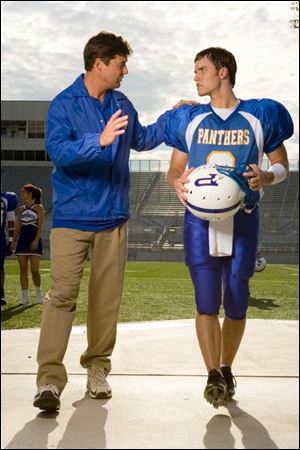
'Friday Night Lights' looks behind obsession of football
10/3/2006
Kyle Chandler, left, plays Coach Eric Taylor, and Scott Porter is quarterback Jason Street in Friday Night Lights.
Anyone who has ever lived in a small town knows the sometimes-absurd emphasis that can be placed on high school football games by people who haven't seen the inside of a high school classroom in decades.
But you don't have to live in a small town, or even know much about football, to appreciate NBC's fine new dramatic series Friday Night Lights, which premieres at 8 tonight.
The series is adapted from the gritty 2004 movie of the same name that starred Billy Bob Thornton as the coach of a football team in a rural Texas town during the 1980s. That movie, in turn, was based on a nonfiction book by Pulitzer Prize-winner H.G. Bissinger that chronicled a season of high school football in Odessa, Texas.
This time around, the story is set in present day in the fictional West Texas town of Dillon, where new football coach Eric Taylor (the very earnest-looking Kyle Chandler from Homefront and Early Edition) has just taken the helm of the Dillon High School Panthers. He knows it's not just another job and he and his team won't be judged merely on the intensity of their efforts.
In Dillon, even fielding a winning team isn't necessarily enough. Plenty of people around town are more than happy to let the new coach know in not-so-subtle ways that anything short of a state championship will be considered a failure. The coach's wife (Connie Britton, the only cast member from the movie to reprise her role here) is as supportive as she can be, but she, too, knows that a lot of expectations are riding on the shoulders of her husband and the 50 teenage boys who play for him.
In the days leading up to the season's opening game, Coach Taylor is working his young charges unmercifully, running them through "hamburger drills" at practice until they can hardly move. At one point, frustrated by their seeming lack of intensity, he calls the players together in the middle of the field. In a quiet but urgent voice, he asks them a simple yet sobering question.
"Are we not clear that in five days, a group of men are going to be coming down here to try to destroy you? Is that not clear?"
As befitting a show centered in large part on teenagers, there are plenty of fresh young faces in the cast, including Scott Porter as star quarterback Jason Street, who has all but locked up a scholarship to Notre Dame; Gaius Charles as mouthy but talented running back Brian "Smash" Williams; Taylor Kitsch as fullback Tim Riggins, who can't stand his teammate Smash and has a bit of a drinking problem; Zach Gilford as untested backup quarterback Matt Saracen; Minka Kelly as Jason's loyal girlfriend, Lyla Garrity, and Toledo native Adrianne Palicki as young temptress Tyra Collette.
In a neat story-telling shortcut, we are introduced to many of the team's key players as they're being interviewed by a visiting television crew. That device, along with the filming and quick editing techniques used throughout, almost makes the show seem like a documentary at times.
The series' pilot episode was written and directed by Peter Berg, who also directed the film version of the story.
He also happens to be the cousin of Friday Night Lights author Bissinger. Berg says one reason he wanted to create the series is because the 90-minute theatrical film version of his cousin's book didn't allow sufficient time to properly explore many of its nuances.
In future episodes, the series promises to address such topics as racism, religion (the players and their coaches do an awful lot of praying), parenting, sex (these are normal teenagers, after all), honesty, and addictions of all sorts.
Despite its focus on football, Friday Night Lights is only peripherally about sports. It's more about relationships, about character and leadership, about sacrifice and having to deal with challenges in ways you're not always prepared for.
And it's also about a certain kind of culture that celebrates hope and redemption and glory and goes looking for all that in a kids' game.
But it's not just about the culture of Texas. That same rabid and vaguely disturbing focus on Friday night gridiron warfare can also be found in Pennsylvania and Ohio and Nebraska and any of countless other places where football is king and where high school sports are no longer just an extracurricular activity for students, but instead an immensely important community event, a rallying point for civic pride, and, for some, a reminder of their own long-gone glory days, real or imagined.
Of course, the series wouldn't be what it is without a healthy dose of on-the-field action, and the last quarter of the 60-minute pilot episode focuses on The Big Game. The football sequences are terrific - as loud and violent and scary as anything most of us are likely to experience this side of a street fight.
The outcome of the game is not terribly unpredictable, but that's OK. In big-screen football movies, from Any Given Sunday to Remember the Titans, we've had a pretty good idea of how the games would end but that sure didn't diminish the fun of watching it happen.
Besides Berg, the show's other executive producers include such accomplished veterans as Jason Katims (Roswell and My So-Called Life), Brian Grazer (The Da Vinci Code, A Beautiful Mind), David Nevins (Arrested Development), and Sarah Aubrey (Bad Santa). With people like that putting this thing together, it's no surprise that it's as well done as it is.
It's a good bet that Friday Night Lights will be brightening up Tuesday nights for some time to come.